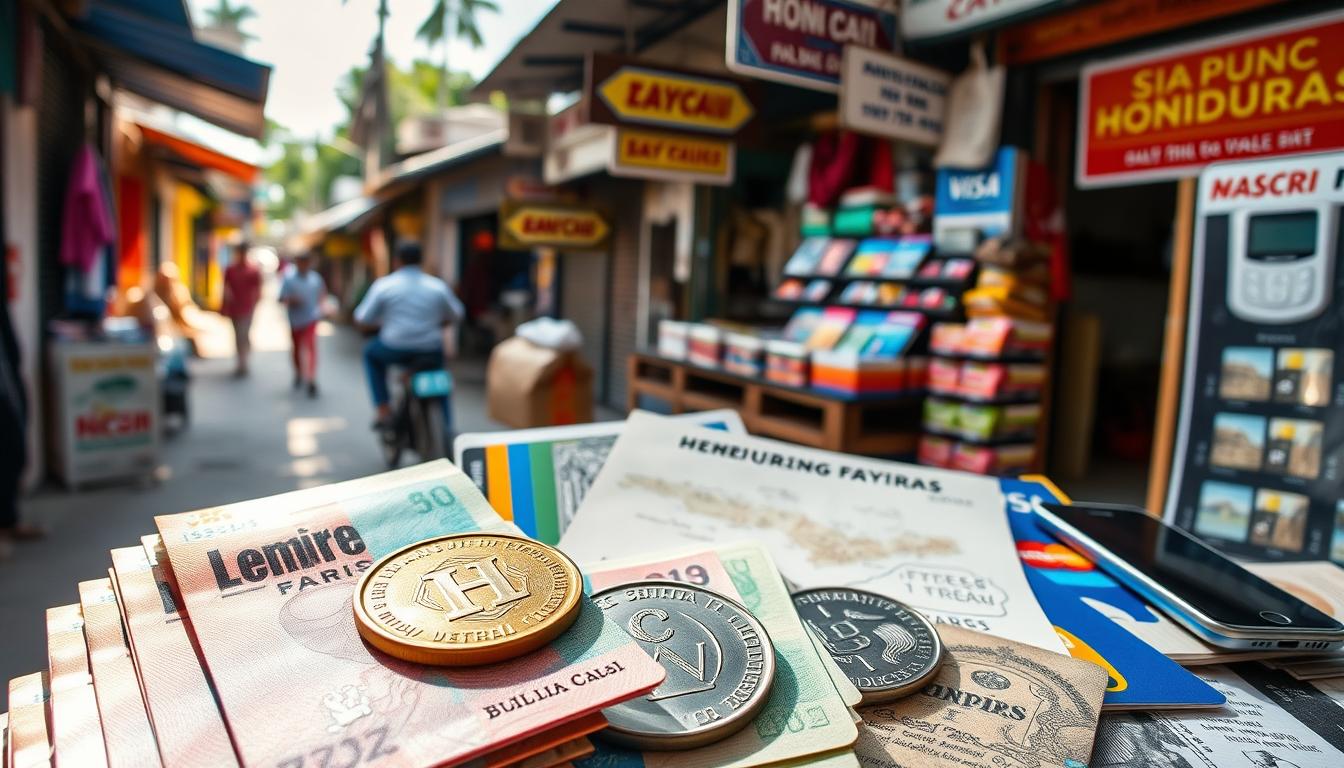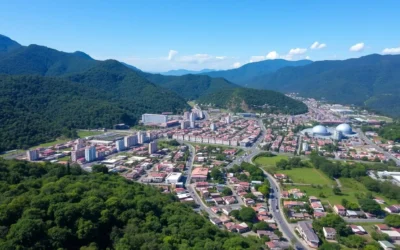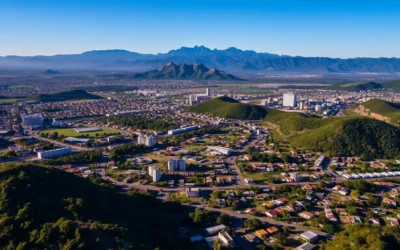✓ Accommodations✓ Flights✓ Rental Cars✓ Tours & Activities
Did you know that the exchange rate for the Honduran Lempira (HNL) has shifted from 2 to 24 lempiras per U.S. dollar since 1980? This surprising fact highlights the importance of understanding currency exchange before your trip. Whether you’re exploring bustling cities or relaxing on pristine beaches, managing your money wisely is key to a smooth experience.
In this guide, you’ll learn everything you need to know about payments and currencies in this vibrant destination. From using cash to leveraging travel debit cards, we’ll cover it all. Make sure to check exchange rates before you go to avoid unnecessary fees and ensure you’re getting the best value for your money.
We’ll also dive into practical tips, like avoiding high fees at airport exchanges and using U.S. dollars in tourist areas. Whether you’re dining at a local restaurant or handling an emergency, this guide will help you navigate your finances with ease. Let’s get started!
Understanding Honduras’ Currency: The Honduran Lempira
When visiting Honduras, you’ll primarily use the Honduran Lempira for transactions. This official currency, with the code HNL, is essential for everyday purchases, from meals to transportation. Knowing how it works will help you navigate your trip smoothly.
What is the Honduran Lempira?
The Honduran Lempira is the national currency of this Central American country. It’s named after Lempira, a 16th-century indigenous leader who resisted Spanish colonization. The currency is divided into 100 centavos, and you’ll find coins and banknotes in various denominations.
While U.S. dollars are accepted in some tourist areas, the Lempira is the preferred currency for most transactions. This is especially true in local markets, small shops, and rural areas. Always carry some Lempiras to avoid inconvenience.
A Brief History of the Currency
The Honduran Lempira was introduced in 1931, replacing the Honduran peso. Its creation marked a significant step in the country’s economic independence. Over the years, the exchange rate has fluctuated, but it remains a stable medium of exchange.
Today, the Lempira plays a vital role in the local economy. Its value is influenced by global exchange rates, which can impact your spending. For example, $1 USD is currently equivalent to about 25 Lempiras. This rate can vary slightly depending on where you exchange your money.
| Currency | Equivalent in Lempira (HNL) |
|---|---|
| 1 USD | 25 HNL |
| 5 USD | 125 HNL |
| 10 USD | 250 HNL |
Understanding the Lempira’s history and value will help you make informed financial decisions during your trip. Whether you’re in a bustling city or a remote village, having the right currency ensures a hassle-free experience.
Planning Your Currency Exchange Strategy
Planning your currency exchange strategy can save you time and money during your trip. Whether you prefer cash or cards, understanding the pros and cons of each option is essential. Timing your conversion and monitoring the mid-market exchange rate can also help you get the best value for your money.
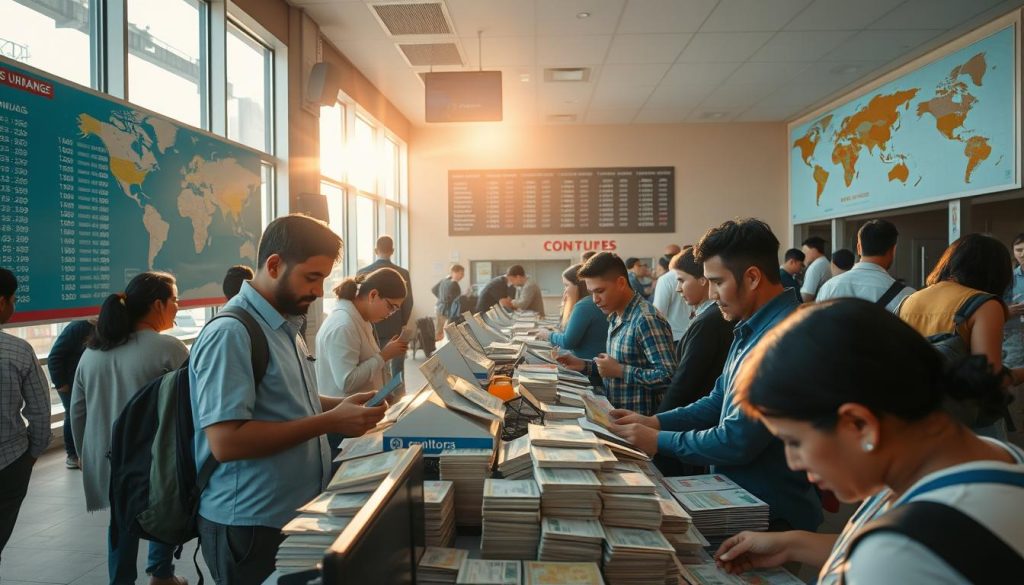
Exchanging Cash vs. Card: Pros and Cons
Exchanging cash before your trip ensures you have local currency on hand. This can be convenient for immediate expenses like transportation or meals. However, carrying large amounts of cash can be risky. On the other hand, using a travel debit or credit card offers security and flexibility. Cards often come with competitive exchange rates, but watch out for foreign transaction fees.
Here’s a quick comparison:
| Method | Pros | Cons |
|---|---|---|
| Cash | Immediate access, no fees at local exchanges | Risk of loss or theft |
| Card | Secure, convenient for larger purchases | Potential foreign transaction fees |
Timing Your Currency Conversion
Timing is crucial when exchanging money. Rates fluctuate daily, so monitoring the mid-market exchange rate can help you convert at the best time. Avoid exchanging currency at airports or hotels, as they often charge higher fees. Instead, use local banks or reputable exchange services for better rates.
Here are some practical steps:
- Check the live exchange rate online before making any transactions.
- Compare fees and rates from different providers to find the best deal.
- Plan ahead to avoid last-minute exchanges at unfavorable rates.
By planning your currency exchange strategy in advance, you can maximize the value of your money and enjoy a stress-free trip.
Using Travel Cards and ATM Withdrawals in Honduras
Travel cards and ATMs are essential tools for managing your money while abroad. They offer convenience, security, and flexibility, making them ideal for handling expenses during your trip. Whether you’re exploring bustling cities or remote villages, understanding how to use these tools effectively can save you time and money.
Benefits of a Travel Debit Card
A travel debit card is a smart choice for managing your currency needs. Cards like the Wise Multi-Currency Card support over 40 currencies and offer mid-market exchange rates. This means you avoid the high fees often charged by banks or currency exchange services.
Travel cards also provide added security. If your card is lost or stolen, you can quickly block it, protecting your money. Additionally, many cards, such as Monzo, offer fee-free ATM withdrawals, making them cost-effective for on-the-go cash access.
Here’s why a travel debit card is a great option:
- Low-cost exchange rates compared to traditional banks.
- Secure spending with minimal risk of theft or loss.
- Convenient for both online and in-person transactions.
Finding Reliable ATMs in Urban and Rural Areas
ATMs are widely available in major cities like Tegucigalpa, offering a reliable way to withdraw cash. However, in rural areas, ATMs may be fewer and charge higher fees. Planning ahead ensures you have enough cash for your needs.
Here’s a comparison of ATM accessibility:
| Location | Availability | Typical Fees |
|---|---|---|
| Urban Areas | High | Low or none |
| Rural Areas | Limited | Higher fees |
Using a travel card with fee-free withdrawals can help you avoid extra charges. For example, the Wise card allows up to $6,000 in monthly withdrawals with some free transactions. This makes it a practical choice for both urban and rural travel.
By combining the convenience of a travel debit card with strategic ATM use, you can manage your money efficiently and enjoy a stress-free trip.
Avoiding Hidden Fees and Poor Exchange Rates
Hidden fees can quickly eat into your travel budget if you’re not careful. One of the most common mistakes is using airport or hotel currency exchanges. These services often charge higher fees and offer worse rates because they cater to a captive audience.
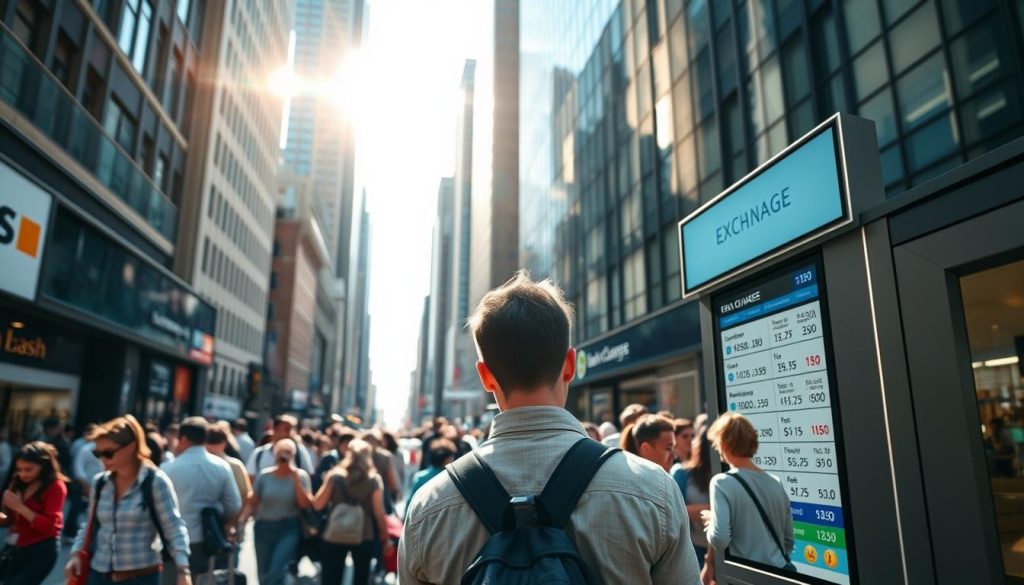
For example, airport exchanges may add a markup of up to 12% on the actual exchange rate. This means you could lose a significant portion of your money before you even start your trip. Always research exchange providers ahead of time to avoid these pitfalls.
Here’s how you can save money:
- Avoid airport and hotel exchanges—they’re notorious for hidden fees.
- Check live exchange rates online to know what to expect.
- Opt for local banks or trusted travel card solutions for better rates.
“Airport currency exchanges are convenient but often come with a high price. Planning ahead can save you a lot of money.”
By taking these steps, you can ensure you’re getting the best value for your money. Whether you’re exchanging cash or using a travel card, being informed is the key to avoiding unnecessary costs.
Tips for Exchanging Money Safely in Honduras
Managing your funds wisely while traveling starts with understanding the safest ways to exchange currency. Whether you’re withdrawing cash or converting dollars, knowing where and how to do it can save you from unnecessary fees and scams.
Steering Clear of Airport and Hotel Exchange Services
Airport and hotel exchanges are convenient but often come with high fees and poor rates. These services target travelers who need immediate cash, so they charge extra. Instead, opt for local banks or reputable exchange offices for better deals.
Here’s why you should avoid these exchanges:
- They typically add a markup of 10-12% on the actual exchange rate.
- Fees can quickly add up, reducing the value of your money.
- Local banks or ATMs often offer more competitive rates.
Using ATMs in Secure Locations
ATMs are a reliable way to withdraw cash, but choosing the right location matters. Use ATMs inside banks or well-monitored areas to minimize the risk of fraud or theft. Avoid standalone machines in remote or poorly lit areas.
Here’s a quick tip for using ATMs:
- Always cover the keypad when entering your PIN.
- Check for skimming devices before inserting your card.
- Withdraw larger amounts less frequently to reduce transaction fees.
By following these practices, you can ensure your currency exchange is secure and cost-effective. Whether you’re in a bustling city or a quiet village, these tips will help you manage your money with confidence.
“Avoiding airport exchanges and using secure ATMs can save you both money and stress during your trip.”
Stay informed and plan ahead to make the most of your travel budget. Safe and smart currency exchange practices will enhance your overall experience.
Accepting US Dollars vs. Honduran Lempira
Navigating payments in a foreign country can be tricky, especially when deciding between local and foreign currency. In many tourist areas, you’ll find that US dollars are widely accepted. However, this convenience often comes at a cost. Understanding when to use dollars and when to stick to the local currency can save you money and hassle.
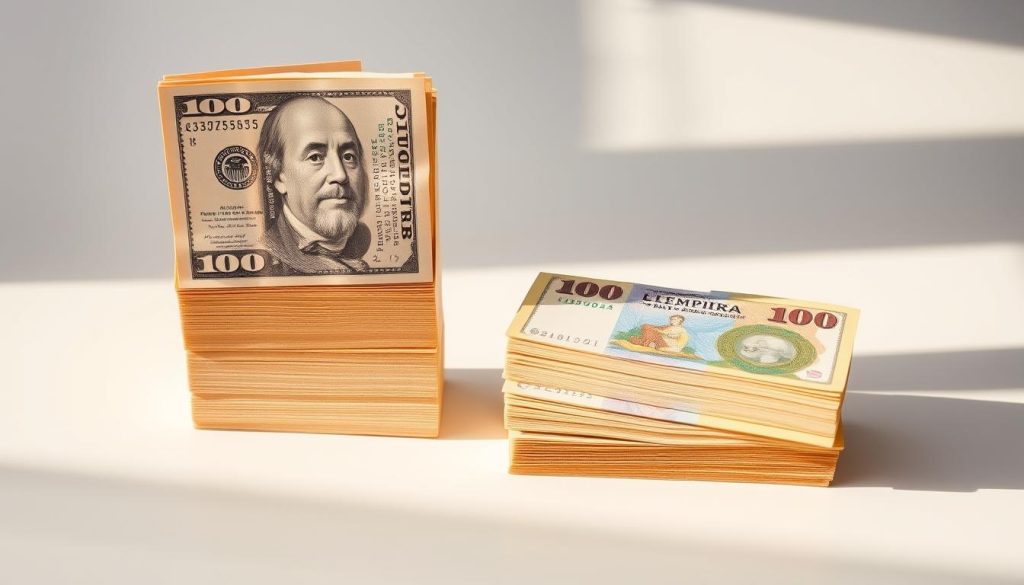
When to Use US Dollars in Tourist Areas
Using US dollars can be beneficial in certain situations. For example, many hotels, tour operators, and upscale restaurants in tourist hotspots accept dollars. This can be convenient if you’re short on local cash or prefer not to carry large amounts of currency.
However, paying in dollars often means you’ll get a less favorable exchange rate. Some establishments may charge a premium for the convenience, so it’s essential to compare costs. For smaller purchases, like a taxi ride or a meal at a local eatery, it’s usually better to use the Honduran Lempira.
Understanding Dynamic Currency Conversion
Dynamic Currency Conversion (DCC) is a service that allows you to pay in your home currency instead of the local one. While it sounds convenient, it often comes with hidden fees and poor exchange rates. For example, if you’re charged in the US dollars instead of Lempira, you might end up paying more due to unfavorable conversion rates.
To avoid this, make sure you’re always charged in the local currency when using a card. Most ATMs and point-of-sale systems will give you the option to choose. Always select the local currency to get the best rate.
| Payment Method | Pros | Cons |
|---|---|---|
| US Dollars | Convenient in tourist areas | Higher fees and poor exchange rates |
| Honduran Lempira | Better exchange rates, widely accepted | May require carrying more cash |
Here are some practical tips to manage your currency effectively:
- Use US dollars for larger purchases in tourist areas but compare rates first.
- Always carry some local cash for smaller transactions and emergencies.
- Opt for a travel debit card with low foreign transaction fees for flexibility.
“Choosing the right currency can make a big difference in your travel budget. Always compare rates and avoid unnecessary fees.”
By understanding the pros and cons of using US dollars versus the Honduran Lempira, you can make informed decisions that save you money. Whether you’re dining out or booking a tour, being aware of exchange rates and fees will help you get the most out of your trip.
Honduras: Ultimate Travelers Guide to Currencies & Payments
Choosing the right payment method can make a big difference in how much you spend during your trip. Whether you prefer cash, cards, or prepaid travel cards, each option has its pros and cons. Understanding the hidden costs and exchange rates will help you make informed decisions.
Cash vs. Cards: What’s the Better Option?
Carrying cash is convenient for small purchases and local markets. However, it comes with risks like theft or loss. Cards, on the other hand, offer security and flexibility. Many travel cards provide competitive exchange rates, but watch out for foreign transaction fees.
Here’s a quick comparison of the two:
| Method | Pros | Cons |
|---|---|---|
| Cash | Accepted everywhere, no fees for local exchanges | Risk of theft, less secure |
| Cards | Secure, convenient for larger purchases | Potential foreign transaction fees |
Prepaid Travel Cards: A Smart Alternative
Prepaid travel cards like Wise or Revolut are gaining popularity. They allow you to hold multiple currencies and offer mid-market exchange rates. These cards are secure, and many come with fee-free ATM withdrawals, making them a cost-effective choice.
Here’s why prepaid cards stand out:
- Low-cost exchange rates compared to traditional banks.
- Secure spending with minimal risk of theft or loss.
- Convenient for both online and in-person transactions.
Understanding Hidden Fees
Hidden fees can quickly add up, especially with dynamic currency conversion (DCC). This service allows you to pay in your home currency but often comes with poor rates and extra charges. Always opt to pay in the local currency to avoid these fees.
“Paying in the local currency can save you from unnecessary fees and poor exchange rates.”
Here’s a summary of fees to watch out for:
| Method | Typical Fees |
|---|---|
| Cash Exchanges | 3-5% markup |
| Credit Cards | 2-3% foreign transaction fees |
| Prepaid Cards | 0-1% conversion fees |
By comparing these payment methods, you can choose the one that best fits your travel and spending habits. Whether you’re dining out or booking a tour, being aware of exchange rates and fees will help you get the most out of your trip.
Managing Your Money on the Go
Staying on top of your finances while traveling has never been easier with today’s digital tools. Mobile apps and online banking solutions allow you to monitor transactions, track exchange rates, and manage your card balances in real time. These tools are essential for keeping your spending in check and avoiding unnecessary fees.
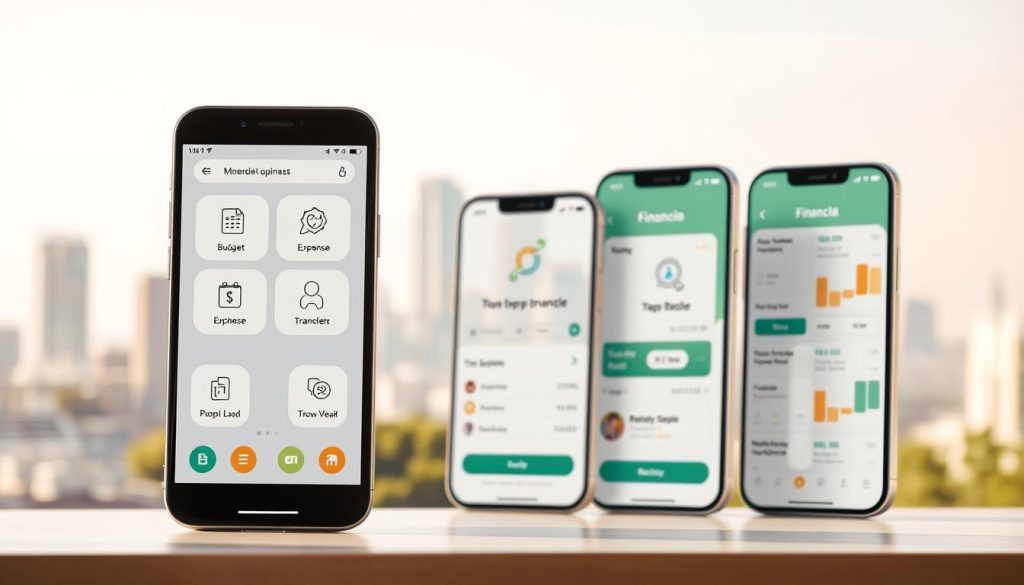
Essential Mobile Apps and Online Tools
Several apps can help you manage your money efficiently while traveling. For example, linking your travel card with a banking app provides instant updates on withdrawals and transactions. Apps like Wise and Revolut offer mid-market exchange rates and low conversion fees, making them ideal for international travel.
Here’s why these tools are useful:
- Real-time notifications for card transactions and withdrawals.
- Live updates on currency exchange rates to help you make informed decisions.
- Secure platforms that protect your financial data.
Best Practices for Online Banking at ATMs
Using online banking services at ATMs can save you time and money. Always choose secure locations, such as bank-affiliated ATMs, to minimize the risk of fraud. Cover the keypad when entering your PIN and check for skimming devices before inserting your card.
Here’s a quick guide to safe ATM use:
| Step | Action |
|---|---|
| 1 | Choose a secure, well-lit ATM location. |
| 2 | Cover the keypad when entering your PIN. |
| 3 | Check for skimming devices before use. |
“Using secure mobile solutions and banking apps ensures your money stays safe while you travel.”
By leveraging digital tools and following best practices, you can manage your finances with confidence. Whether you’re tracking expenses or withdrawing cash, these strategies will help you stay in control of your money on the go.
Local Insights and Traveler Tips
Understanding local customs can make your trip smoother and more enjoyable. Locals often have the best advice on how to handle cash and card payments, especially in areas where ATMs are scarce. Their insights can help you avoid common pitfalls and make the most of your travel experience.
Experiences Shared by Locals
Locals recommend carrying a mix of cash and cards for flexibility. In rural areas, ATMs may be limited, so it’s a good idea to withdraw enough cash before heading out. In cities, cards are widely accepted, but smaller shops and restaurants often prefer cash.
One local shared, “Always keep small bills for bus fares and street vendors. They rarely have change for larger notes.” This simple tip can save you a lot of hassle during your trip.
Common Pitfalls to Avoid
One common mistake is relying solely on cards in remote areas. ATMs may be out of service or charge high fees. Another issue is not checking transaction details when paying with a card. Always confirm the amount and ensure you’re charged in the local currency to avoid extra fees.
Here are some practical tips to avoid these issues:
- Carry enough cash for daily expenses, especially in rural areas.
- Use cards for larger purchases in cities to minimize cash handling.
- Always verify transaction amounts and currency before finalizing payments.
By following these insights, you can navigate payments with ease and focus on enjoying your travel experience. Whether you’re exploring a bustling city or a quiet village, these tips will help you stay prepared and avoid unnecessary stress.
Conclusion
Managing your finances effectively during your trip ensures a stress-free experience. Understanding the local currency and monitoring the exchange rate are essential steps to getting the best value for your money. Planning ahead by choosing reliable banks or travel cards can save you from unnecessary fees and hassles.
Always prioritize secure payment methods, such as using ATMs in well-monitored locations or carrying a mix of cash and cards. This approach provides flexibility, especially in emergencies or when traveling to remote areas. Keep an eye on transaction details to avoid hidden charges.
By integrating these tips into your travel plan, you can focus on enjoying your destination without worrying about financial setbacks. Take the time to review your options and prepare in advance—it’s the best way to make the most of your journey.
The above is subject to change.
Check back often to TRAVEL.COM for the latest travel tips and deals.
